Interview: ‘The Act of Killing’ director Joshua Oppenheimer
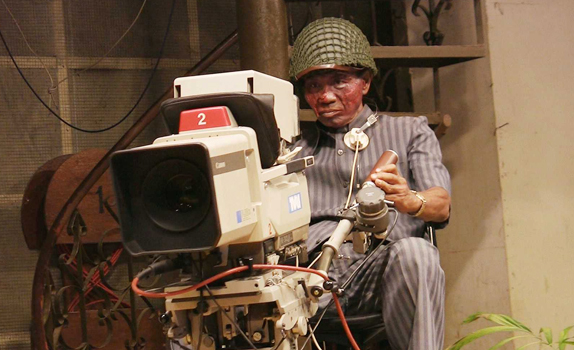
A favourite in the Best Documentary category at this year’s Academy Awards, The Act of Killing is a unique, surreal and impactful film that was one of 2013’s most compelling cinema experiences. As the film arrives to home video, we spoke with director Joshua Oppenheimer about his documentary which explores the contemporary consequences of mass killings carried out in 1960s Indonesia. By encouraging the proud perpetrators to re-enact their actions in the style of various film genres, Oppenheimer coaxes out some of the most deeply resonant moments seen on screen.
FLICKS: The Act of Killing was my favourite film of 2013, although favourite may be the wrong way to put it. As I’ve recommended the film to people I’ve found myself qualifying that somewhat because it’s not exactly easy going.
JOSHUA OPPENHEIMER: Not to blame anyone individually, but I think that cumulatively this has meant that far fewer people have watched the film than should have. Not to say that everyone should watch it. People often tell me “I’m scared to see your film because the violence is very graphic” or because it has victims acting in re-enactments of their own torture – and I would say neither of those things are true. All of the performers in the re-enactments are always, with the exception of Anwar’s neighbour, they are all the perpetrators or paramilitary leaders and their immediate families and the film is not graphically violent and therefore not viscerally impactful so much as it is emotionally impactful. But I think it’s sort of got a reputation for being also like a slasher horror movie in its violence, and it’s a pity.

From the title onwards its easy to cultivate the thought that it is a challenging picture in terms of its graphic content, but as you say it’s the emotional impact… I saw it at the NZ International Film Festival, went back to my desk and found myself for about an hour just moving my mouse around and thinking that none of my work emails had much point after seeing this profound film.
Well thank you. That’s what it’s meant to do.
I thought one of the things it did was open a window into a society where the prevailing orthodox social mindset is rooted in historical cruelty. Do you think that’s fair to say?
This is a very simple point, but I think it has complicated and profound consequences. It’s really a film about what happens when killers win and build a regime on the basis of celebrating their victory, celebrating what they’ve done as something heroic and patriotic and glorious. Not necessarily because in their hearts they believe it is, it can also be – and I certainly think this is the case with [central character] Anwar Congo, and actually every other perpetrator I’ve met – being human beings, of course they know that mass killings of defenseless human beings is wrong, but to acknowledge that would be too painful and difficult and so they desperately cling to the excuse of the moral lie in which they claim it was heroic.
It’s easy to see the film as a nightmarish vision of a strange anomalous world where killers have won. Normally the killers get their comeuppance, there’s expiation. The Nazis were removed from power. The Hutu extremists were removed from power. The Khmer Rouge were removed from power. But I think those examples of genocidal regimes being removed from power are in fact the exception, not the rule. Regimes commit mass violence because it’s effective. Because it keeps people afraid, because it augments their power, because it consolidates their rule. And normally they win, otherwise they wouldn’t do it.
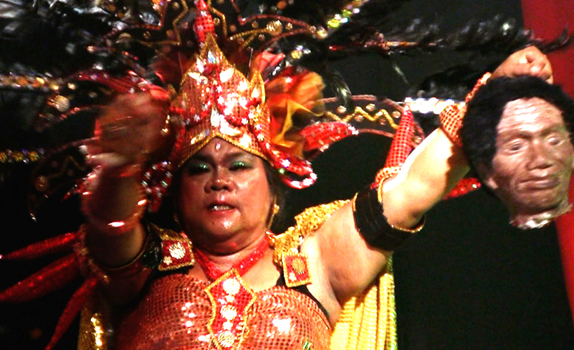
What’s unusual here, if anything, is the boasting of the perpetrators. The boasting is a kind of allegory for the rule and is not an exception to the rule. I think the boasting is pretty easy to account for, given that they won. They’ve never been forced to admit what they’d done was wrong and the perpetrators know that at the time of the killing the whole Western world was celebrating what they were doing. Time Magazine and the New York Times here in the United States published headlines The West’s Best News for Years in Asia and A Gleam of Light in Asia, followed by stories of rivers choked with bodies, running red with blood and hundreds of thousands of people being killed. So mass murder was celebrated as good news in the Western media and the perpetrators even down to low ranking executioners all know this. So it’s not a surprise that they’ve been able to cling to a lie telling themselves that it was justified and glorious so they don’t have to live with guilt, or such tormenting guilt.
This might be drawing a bit of a long bow, but to make a comparison to the United States, the lies from their current wars are about low levels of collateral damage, accidental killings – a lie of harm and casualty minimisation. Watching The Act of Killing it seems a society needs to make up a lie whenever if commits killings.
I absolutely agree with you about the United States. One of the very first perpetrators I filmed took me down to a river bank and showed me how he was given busloads of people by the army who he had to decapitate every night. He showed with his fellow death squad veteran how they would bring the victims down there, taking turns to play victim and perpetrator, totally spontaneously. At the end he pulled out a point and shoot still camera and asked us to take pictures of him and his fellow death squad veteran posing, giving the thumbs up and a V for victory. This was in February 2004 and I brought that material back to London, where I was living at the time, horrified by what I’d just seen. And then in the spring of 2004, the Abu Ghraib photographs appear in the world’s media showing American soldiers giving the thumbs up and the V for victory while torturing people.
The question begged by both the Abu Ghraib photos and the photos of the two death squad veterans is not so much what did they do, how did they torture people or how did they kill people, but rather in what moral vacuum are the photographs being taken in which such images would be seen as souvenirs bearing happy memories. Why would anyone want to look at that photograph of them giving the thumbs up and smiling in a place where they have killed hundreds of people, or giving the thumbs up and smiling while having a naked prisoner on a chain, on a leash on all fours at their feet. Why would anyone want to look at that?
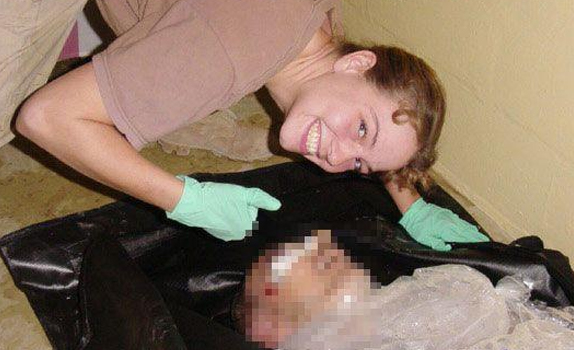
The film The Act of Killing is my attempt to expose, analyse and condemn that moral vacuum. In that sense it’s an intervention, and the film has been an intervention in Indonesia, where it’s radically changed the way these events are discussed by ordinary Indonesians and the way the present corruption is discussed. Once a regime commits atrocities… it’s put really concisely in the film: “Killing is the worst thing you can do. But if you’re paid well enough for it and you get away with it, go ahead and do it”. But then you must make up an excuse so you can live with yourself afterwards, you must lie to yourself. And when a regime commits an atrocity and collectively makes up an excuse, the excuse that they write to justify their actions is called ‘the victor’s history’.
The film is very much about the consequence of maintaining that lie. Maintaining the lie inevitably leads to this downward spiral into further evil and corruption and culminating in a total moral vacuum, the one I just described talking about the photographs from both Sumatra and Abu Ghraib. Because once you have killed and imposed upon your whole society a lie, a victor’s history justifying it, you now have to blame the victims because of course they had it coming to them – that’s what the propaganda says. You have to dehumanise them because it’s much easier to live with yourself if the people you’ve killed aren’t fully human. And you have to kill again, and that’s the most awful part. Because if the government says “now kill this group of people” for the same reason you killed the first group, refusing the second time is tantamount to admitting it was wrong the first time. And that’s exactly what Anwar fromThe Act of Killing must never do, he must never admit the true meaning of what he has done.
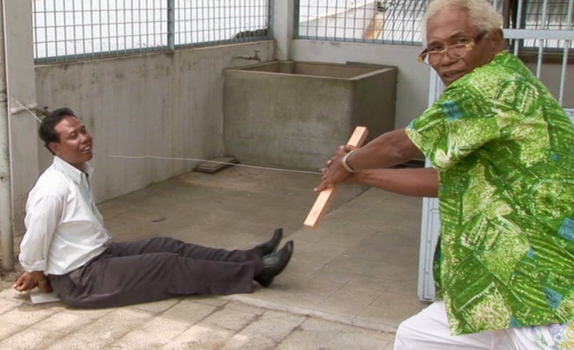
In a sense the whole method of the film was to see if by screening back for him, starting from the first scene on the roof, if by screening the footage back for him he might recognise the moral meaning of what he’s done in the mirror of the footage. And I think that he does, unconsciously and even somewhat consciously. He looks very disturbed, even at the beginning of the film when he watches himself on the roof and says he looks like he is dressed for a picnic. He looks very disturbed but he doesn’t dare admit why he’s disturbed, he lies to himself and to me about what he’s feeling.
Instead of saying “this is awful, this makes me look bad”, or “I felt awful” – to say any of those things would be to admit that what he’s done was wrong, and instead of doing any of that he lies to me and to himself and says, “my acting’s bad, my clothes are wrong”, and he starts proposing embellishments. And the embellishments become more and more surreal and more inspired by his favourite Hollywood films. But what’s fuelling the whole process is him trying to deny the moral meaning of what he’s done; him trying to deny the image that he sees in the mirror. In that sense it’s not so surprising, given that fuelling the whole process is his conscience, that the fiction becomes a sort of cinematic prison in which he realises the true meaning of what he’s done. And through which Indonesia as a nation, and the world, realise the true meaning of political violence.
Perhaps you can explain how you’ve shown it to Indonesian audiences, and how it’s been received?
We began by holding private screenings at the National Human Rights Commission in Autumn of 2012. Through Indonesian film-makers, celebrities, news publishers, news editors, writers, artists, intellectuals, human rights activists and so on – everybody who saw the film said everyone in Indonesia needs to see this film as quickly as possible but don’t try and put it in cinemas yet because if you do that you’ll have to submit it to the censors and if they ban the film that will make it a crime for anyone to watch the film forever. Or at least until the ban is overturned. And that in turn will scare people from watching it because it will be an excuse for the army to physically attack screenings and we don’t want that to happen. So we’ve instead encouraged everyone to take the film back to their communities in the hopes that they’ll hold screenings.
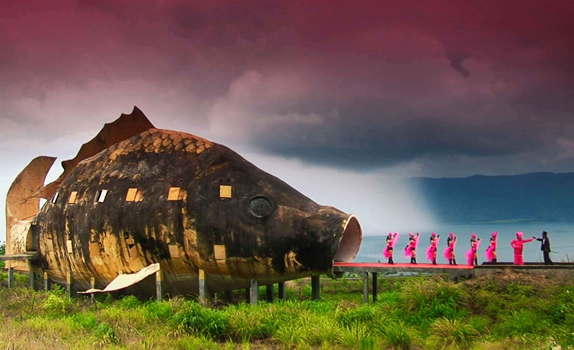
There are now thousands of screenings in hundreds of cities, some of them quite amazing. There was a screening held by a group of survivors and relatives of perpetrators alike, together, at a mass grave. Now I would normally never suggest that the film should be screened at a mass grave, but that’s where they held the screening. This is a grave that survivors were not even allowed to visit. they would go to try and pay their respects every year at the end of Ramadan when you’re supposed to do that, and groups like Pancasila Youth would show up and beat people up if they got too close to the grave. After the screening the survivors and the children of perpetrators have been going together to pray at the grave on a regular basis.
Similarly, another screening in the city of Palu, the mayor of Palu, which is a pretty big city in Sulawesi, said – “I was a perpetrator. I was involved with arresting people that were taken to be killed. I feel as if I have to apologise for it. The city will apologise, we’ll issue an apology at city level. If the government won’t apologise at a national level, individual local authorities have to take it upon themselves to apologise because running a local authority is about building a community, and communities can’t exist if people are afraid. Fear breaks communities apart, it separates people. So I’m going to start by issuing an official apology on behalf of the city of Palu.”
The editor of Temple magazine, a leading news publication in Indonesia, the editor saw the film at one of those early screenings at the National Human Rights Commission and phoned me afterwards and said, “Josh, there was a time before The Act of Killing, now there will be a time after The Act of Killing. I’ve been censoring stories about the genocide ever since I’ve been in this job and I won’t do it any more. because your film showed me above all that I don’t want to grow old as a perpetrator.”


















